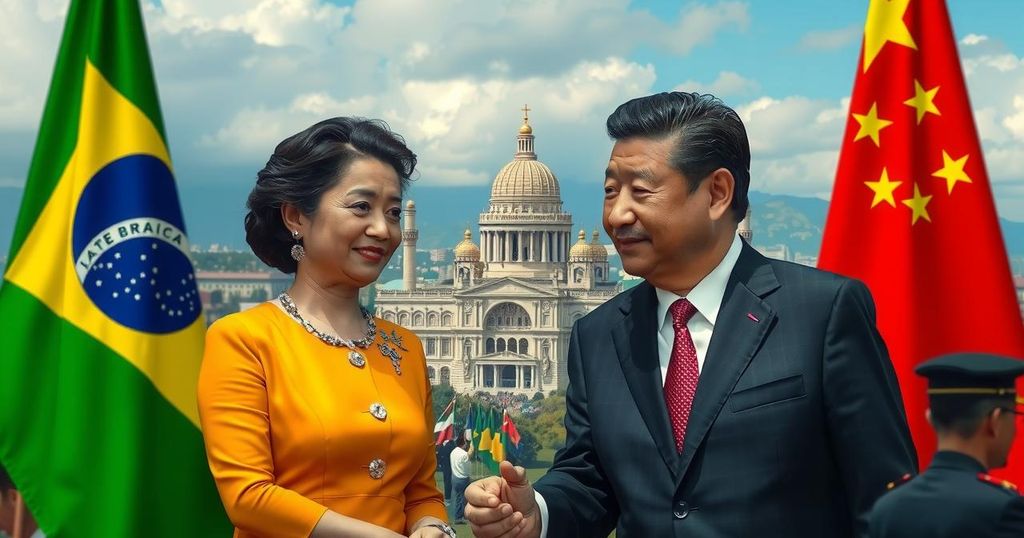Brazil and China Strengthen Ties During Xi Jinping’s State Visit

Brazilian President Lula da Silva welcomed Chinese President Xi Jinping, marking strengthened relations exemplified by 37 signed agreements across diverse sectors. Trade between the countries reached $136.3 billion in 2024, following Brazil’s strategic pivot towards China post-Bolsonaro. Experts observe that while strengthening ties is essential, Brazil must navigate potential conflicts with Western interests.
Brazil’s President Luiz Inácio Lula da Silva received Chinese President Xi Jinping at the Alvorada Palace in Brasília, marking a significant strengthening of relations between the two nations. This visit, noted by analysts as pivotal against a backdrop of shifting global dynamics, resulted in the signing of 37 bilateral agreements covering various sectors, including trade, agriculture, and technology, signifying the growing commercial partnership between Brazil and China.
China has become Brazil’s primary export destination since 2009, surpassing the United States, and their trade relationship has flourished, reflected in substantial bilateral trading figures. As President Lula seeks to renovate Brazil’s international stance following a period of estrangement under former President Jair Bolsonaro, his engagement with China suggests a strategic pivot to enhance economic collaboration on the global stage.
In light of geopolitical changes, particularly with former President Donald Trump’s anticipated return to power, Lula’s invitation to Xi Jinping is seen by experts as perhaps a response to an American foreign policy that has historically neglected Latin America. The increase in trade, which reached $136.3 billion in 2024, indicates the potential for further investment opportunities and enhanced cooperation in addressing climate change, despite Brazil’s reservation towards joining China’s Belt and Road Initiative (BRI).
Although Lula has indicated a desire to foster strong ties with China, analysts caution that excessive alignment with Beijing might strain relationships with Western nations. Future dealings will likely reflect a balance, affirming Brazil’s position as a sovereign nation in a negotiating stance on the international front.
The relationship between Brazil and China has evolved significantly since China became Brazil’s largest export market in 2009. This growth is marked by increasing trade and investment ties, and recent developments signal a strengthening bond, notably through the agreements signed during Xi Jinping’s visit. As political dynamics shift globally, especially with the prospect of Donald Trump’s return to the White House in 2025, Lula’s administration is focusing on reinvigorating Brazil’s international relations and economic stance, particularly with emerging powers like China.
The state visit of President Xi Jinping to Brazil underscores the vitalizing partnership between the two countries, characterized by significant trade agreements and collaborative efforts in various sectors. Lula’s approach aims to reposition Brazil after previous years of diminished international engagement, emphasizing a strategic partnership with China that reflects broader geopolitical realities. Looking forward, Brazil’s navigation of its relationship with China will be critical as it balances its commitments with Western nations.
Original Source: www.livemint.com








